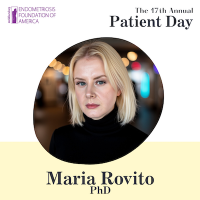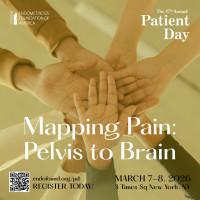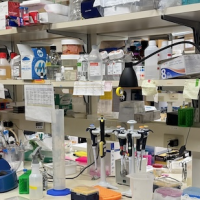Endofound Medical Conference 2017
"Breast, Ovary and Endometriosis"
October 28, 2017 - Lotte New York Palace Hotel
Hormones and Brain: Theory and Practice
Sarah L. Berga, MD, FACOG
Professor and Chair of Obstetrics and Gynecology Wake Forest School of Medicine
Thank you Dr. Seckin for inviting me, and thank you, audience. I'm going to talk about a couple of different topics now. When you're treating women with hormones, you have to remember one of those other rare reproductive organs called the brain. I'm going to talk a little bit from my vantage as a neurobiologist, even though I am also a gynecologist. Most of my research is in neuroendocrinology. I wanted to talk about brain health. Hopefully I get this right. Disclosures. I wanted to talk about what's known, and mostly what's not known about the use of aromatase inhibitors and SERMs and brain health, and show you ha little bit of the research that we are doing, and others, just to help you think about the topic.
I won't have that many answers, but I think there is a fact. The fact is the brain is a target for sex steroids. There are several studies now that have found an association between perimenopause, changing hormone levels, and increase in depression, stress, and what is commonly called cognitive fog. In the SWAN, which is the study of women across the nation at midlife, there was a four-fold increase in major depressive episodes at the time of perimenopause. This leads to our current hypotheses that hormonal exposures have the potential to be both neuroprotective, or to be accelerating brain aging.
I think none of us want our brain to age any faster than it has to. We're going to deal with a concept that estrogens actually may promote brain metabolism, synapses, better mood, and cognition. And that progestins might have the opposite effect, and that SERMs and AIs may accelerate brain aging. I'm not going to have a ton of facts for all of these. There are lots of, lots of little facts on the slides. Please ignore them. That's just to show you that there really is pretty high powered research behind most of these ideas, even if there isn't complete answers at this time.
I think most OBGYNs know that perimenopause and early menopause is a time of life when women start to report symptoms that are often called soft symptoms. They're difficult to put into perspective, and difficult to treat in many ways because they're not really classical gynecologic complaints. These include difficulty with word finding, reduced libido, mental fog as we've talked about. Hot flashes and insomnia are more common. We also have begun to recognize in large population studies that women are at higher risk for neurodegenerative disorders, not all of them but some of them, including dementia as compared to men. Early loss of ovarian function, or things that would actually masquerade as reduced ovarian function actually have the possibility of accelerating brain aging.
This is a lovely study that is relatively recent, looking at cognition in the perimenopause. The little asterisks are showing the decrement in verbal learning, verbal memory, fine motor skills, and attention and working memory that's found in the early perimenopause, early menopause transition. When women actually become hypo estrogenic, these are some of the symptoms that they report. If you're an OBGYN, these are not really your comfort zone, right? This is not where you spend most of your time thinking what you're going to do.
Sound bites that help frame this conversation for me are that not all hormones are the same. The use of the word estrogen is kind of a big class of hormones, not a specific hormone. There's a lot of misunderstanding about that. Not all progestins are the same and not all women are the same. We never have any trouble with that third one, right? Everyone knows that they're all different. But the other concept that's really hard to get across is that hormones are potent. It's actually a pretty narrow U-shaped curve for risk and benefit. Most of the time what you see, or what you want falls within a pretty narrow range.
If you're having trouble with this idea, think insulin. A little too much, and a little too little, and you really find yourself in trouble. How many of you have ever overdosed a person with levothyroxine? Have you ever seen someone in thyroid storm? It's not a very good picture. They're not very happy. Really they only have about a 10 or 20% increase in levothyroxine when you get that kind of a picture. You really have to get the dose right. We haven't paid that much attention to doing so.
This is my homage to the cellular people in the room. I kind of think of this as balancing the growth versus the atrophy. You don't want your brain to atrophy, and you want it to grow and renew itself. But you don't want all the cells in your body to have overgrowth. How can you balance those two? Some of what happens is that cells that are older actually aren't the same, even if they're the same cell type as when they were younger because of telomere or shortening. Of course, this is the famous group that was headed by Elizabeth Blackburn that won the Nobel Prize for discovering telomerase and telomere length.
The main point, I think you can see right here, is that cells keep dividing if they have long enough telomeres, and what keeps them long is telomerase. If they have insufficient telomerase, then they stop dividing and they develop essentially an atrophic syndrome. There's been a study or two. All of these are relatively new, trying to look at the relationship between telomere length and telomerase and the brain. This was one that's looking at hippocampal volume in early aging.
The hippocampus is the part of the brain that's typically degenerating in Alzheimer's disease, and it is important for location and memory. Greater exposure to estrogen was associated with an increase in telomere length in this one study. Telomere lengths were longer in women who had used hormones postmenopausal, and low levels of estrogen and obesity were associated with shorter telomere length in this study. That's about as far as people have gotten on that pretty complicated topic. It's too early to conclude. I sort of say, and this is intended, keep an open mind. We're not sure what we want to recommend quite yet. We are sure that hormones have a variety of effects.
These are some of the cellular effects that they have. We've been talking about those cellular effects as they relate to endometriosis, and endometrial cells. But now I'd like you to shift your attention to think for a moment about neurons and other cells in the brain. Behind the background of this slide is two neurons. Each neuron will have as many as 10,000 connections with another neuron group. Each neuron can actually connect in 10,000 different ways. If you think of all the neurons that there are, and all the different connections, suddenly you realize that this is an incredibly ... I'd say, metabolically active would not quite do justice to it ... an incredibly active part of the body.
There are a lot of neurotransmitter systems, all of which so far have been shown to be impacted by sex steroids. These are some of the functions that those neurotransmitter systems mediate. Here are some of the behaviors as well. We all know that what patients report are their behaviors and their feelings. What we're thinking about when they're reporting them are what body part is this involving, and what can we do about it? When you think about the complexity, then it's a little intimidating. I think most people just decide to back off and not think too much about it.
Some of us decided to lean in. One thing that's fascinating about the brain is how much of your daily energy intake it actually requires. Infants require 60% of their daily energy intake for their brain. Humans, about 25%. When you have an animal model, and you're studying hormones, and it's a rodent, it's really not going to actually let you answer the kinds of questions about brain health that you might want. The brain is actually 2% by weight, but 25% by oxygen consumption.
This is an argument by analogy. I talked a little bit about getting thyroid hormone levels right. People who have thyroid cancer have to periodically come off their levothyroxine to look for metastasis or expansion of their thyroid cancers. When they do, people have put them in the neuroimaging machine to ask questions about what the brain is doing. What you can see is there's a decrease in cerebral blood flow by about 23%, and that's accompanied by a 12% decrement in brain metabolism. This, you can find using positron emission tomography and looking at glucose uptake in brain regions. You can actually do that task free, or with tasks. You can give the brain activational tasks and see if the brain can respond to those tasks in the same way before and after perturbation, or an addition of a hormone.
That's what was done here. It was before and after the addition of levothyroxine. Without the levothyroxine, there were complaints that are pretty similar to menopause, depressed, anxious, and psychomotor slow, and those were of course corrected. What's interesting is how few brain centers are impacted for the patients to be symptomatic. These little spots are actually the brain centers that were different before and after levothyroxine, but that had a very major impact on cerebral blood flow as well as a major impact on metabolism and behavior.
These are studies looking at women who are taking hormones who were randomized to stop or not. This was about the time of the WHI and putting people on hormones at that point was kind of heretical. Instead of doing that, they asked people if they would agree to be randomized to stop or not. They came in on their customary hormone cocktail, and then they were asked to either continue or not continue. Then they were studied by PET scan at one and two years. Very interesting set of studies. I'll just show you this part here.
Hormone users showed relative preservation of frontal and parietal cortical metabolism. The Estradiol users were three standard deviations better in verbal performance than Premarin users. So pretty amazing. The E+P group had lower metabolism than the E alone group.
When thinking about the brain, it's pretty hard to do a randomized clinical trial and see if they're going to get Alzheimer's or not because none of us are going to be around to count the data. You have to use other pieces of the puzzle to try to figure out what's going on, and lots of different methodologies have been basically utilized to try to address these questions.
Some of the questions that we've been trying to answer through a variety of methodologies are whether sex steroids promote plasticity and maintain brain function, and confer neuroprotection. What are the risks of altering in premenopausal life, sex steroid exposures? Just to reorient you, this is a synapse. It's a pretty metabolically active part of the body. When you lose about 25% of these delicate little parts of your brain, you start to have mild cognitive impairment. This is before you can actually be clinically diagnosed. It takes awhile. There's a ceiling effect, if you will, before you start to see the brain malfunction due to a loss of synapses.
This is an animal model. These are monkeys. They were ovariectomized and then some were given back Estradiol and some were necropsied here without Estradiol. This black dots are spines or synapses. You can see without Estradiol there is a loss of synapses. The good news is by replacing Estradiol for three months, you can actually have these synapses regrow. Just keep this in mind. If you were a human, and you had this brain ... Let me get this to go back ... you would probably be faster in your thought processes, and if you had this brain you would probably be slower just because your neurons are now not as connected as they once were.
What has been shown so far, and there's very few studies, so if you go out and do the literature search on this, it won't take you too long ... is that Letrozole exposure actually reduces those spines in the brain. That's a problem because this is a drug that's used for lots of different things. We're talking about it today for breast cancer and as well as for endometriosis. Of course you know it's an aromatase inhibitor. This is a mouse model. It's going to underestimate probably the impact in humans, but basically if you look at it, certain parts of the brain are much more sensitive, particularly the hippocampus, which is in fact the part of the brain that falls apart in Alzheimer's disease.
This is just another study showing the same, but what's interesting about this study, and the reason I put it up there is that the male mice have a different response to Letrozole than do the female mice, in terms of spine number. This is very delineated event, and is not seen. Estradiol actually falls, as shown here in both the males and the female mice. In only the female mice do you see the spine number diminish.
Estrogen has many, many effects on neurons and the supporting part of the brain, including the glia. We don't really understand them all, but at least they operate through ER alpha, ER beta, and through membrane receptors, which are shown here. We're not sure all of the ways in which Estradiol keeps brain metabolism up, so I can't tell you that we have a complete story, but this is a nice picture to show that there are many mechanisms by which estrogens impact positively the brain.
This is the very first study that was done using a task to ask questions about whether estrogens helped. This estrogen was conjugated equine estrogen. These are 60 midlife women, and they're given just a very short exposure to conjugated equine estrogen for 21 days. The task is reading and understanding what you've read. When you do that, they read better when they're on estrogen than off. Then they do the neuroimaging studies to accompany this, to show that the brain is actually more engaged or activated during the reading task when there's estrogen in the background.
This is a comparison of 17 beta Estradiol with a conjugated equine estrogen, this time just neuroimaging. This is another similar kind of study, just to show that Estradiol in this study increased frontal activation and allowed the brain to tackle more complicated tasks. There's been not that many of these studies, so when this was done, this review was done in 2014, there had only been 35 studies. That's the sum total of studies in humans looking at hormones and activation.
We do know that depressed mood can sometimes masquerade as reduced cognition. Part of this story that we're trying to understand has to do with what impact hormones have on mood as well as directly on cognition. Again, if you look at these two neurons, I think you get a sense of the complexity. The blue and the red are just two neurons. You can imagine how much complexity that confers if there are more neurons than there are stars in the Milky Way, which is in fact true. This is a brain that's depressed. This is serotonergic binding in the temporal lobe of a not depressed person. This is the serotonergic hypothesis of depression, showing that depressed individuals have less serotonergic drive.
This is one of our original studies looking at the impact of 17 beta Estradiol at the dose of 80 picogram per ML on recently postmenopausal women's brains, and looking at serotonergic binding. Long story short, is doing this region of interest analysis and looking at the frontal lobe we could see that Estradiol plus progesterone restored the brain's serotonergic binding in key cognitive areas, and in key emotional areas.
This is a study I think is very interesting to note. When you are stressed, you have high cortisol and if you're stressed long enough you can get depressed. What's interesting is that cortisol actually interferes with estrogen action in many tissues including the brain. Just for Dr. Taylor, I'll say that cortisol hijacks the cellular machinery needed for estrogen action. He doesn't like it when I say that. This is a lovely study by [inaudible 00:19:21] showing exactly that, that several hundred genes were co-regulated by both dexamethasone and Estradiol in an antagonistic fashion. If cortisol gets there first, then estrogen action is interdicted.
It's not the same in male and female rats. You really have to remember that there are major sex differences, both at the level of the brain and other tissues. Even a simple hormone like cortisol doesn't have the same effects. This is just looking at gene expression in female rats and male rats, given the same dose of glucocorticoid. What's even more interesting is when they were given LPS to mimic an infection, and cortisol, the male rats lived longer and the female rats died earlier. Cortisol in females actually was pro-inflammatory in this model.
This is another pretty complicated set of studies. I'm just going to focus on the last one, showing that acute stress, shown in green, actually decreases the availability of estrogen responsive parts of the brain to estrogen. Just the fact that you're stressed actually makes estrogens have a different action in the brain. Again, which hormonal agents are best for brain? That's a much more complicated question now than one would be thought. Which hormonal agents are worst? At least in terms of this one review by Pauline Mackey, the worst progestin in her mind, is Medroxyprogesterone acetate.
I like this slide because it's monkeys, and they're easier to blind than humans, and we want to study behavior. The two behaviors that were studied in this were female sexual initiation and female to female antagonism, both of which are important things to understand, I would argue. I hope you would agree. In this one right here, Medroxyprogesterone acetate completely obliterated interest in sex. In this one, it was wonderful for sustaining female to female antagonism.
So, I had a patient come in one day telling me that she'd been placed on Prempro and that she was telling people on the street how to behave. She was about five foot one and 110 pounds. I said, "This is life-threatening. You need to stop the hormone or otherwise you may not come to see me again. You may not be alive long enough." We put her on something else. We sort of triaged her behavior to the top of the pile, didn't matter what else was going on.
This is anxiety and Estradiol versus Tamoxifen, again in a monkey model, and just showing that if you give placebo to ovariectomized monkeys, they're about this anxious. If you give some estrogen they're less anxious. If you give Tamoxifen, they're more anxious. If you put the two together, you'll get something intermediate. This is a study we started in Pittsburgh looking at early stage breast cancer survivors, and looking at brain function. In the beginning we actually couldn't do very good MRI. We started just with a batter of psychometric testing.
This is our own PhD Kathy Bender, who's the PI on the grant. What she found is that cognitive impairment was more severe and there were more memory domains impacted by women who received Tamoxifen as adjuvant therapy versus nothing. Then when people started using more commonly aromatase inhibitors, they were added to the pool. In her studies, Anastrozole was worse than was actually Tamoxifen. I got to see these patients clinically because they were part of the star trial. They were coming into my office with just an incredible load of complaints. I had no perspective on how to handle them at the time. That's partly how this study got started.
This is the only study that's ever looked at an aromatase inhibitor and brain function. It's just after six months of exposure. The women were given tasks, and then given six months of an AI, and then given the same tasks again. What it showed is that in order to perform the same on the tasks, they had to try harder and there was more brain activation when they were on an AI.
Then this is a lovely study in which women with breast cancer were given adjuvant therapy, and then stopped it. Then they looked at their cognitive function at the end of five years, and then after one year off adjuvant therapy. There was an improvement in psychometric performance.
So, that's a whirlwind of data, just to kind of get your feet wet. I know you're not in necessarily the neurobiology world, but I think when you start thinking about it from a mechanistic point of view, it's plausible. There's reasonable data out there to worry about the impact of aromatase inhibitors and SERMs on brain function. While it doesn't give us hardcore answers, I think it should at least raise questions.
This is a lovely study. This was done in Utah in Cash County, and it's prospective observational trial of men and women free of disease and enrollment at age 65. They're following them for dementia, all cause dementia. You can see that women have much higher rates of all cause dementia as they age, and that the longer they used any kind of hormone, the lower the risk of dementia. So while hormones won't prevent dementia, they do seem to mitigate the risk.
We got curious, we're doing studies on neurotrauma. We got curious as to the hormone levels in the CSF because you know the bloodstream isn't really where all the action is, at least if you're in neurobiology. You may have wondered whether testosterone levels in the bloodstream translated into testosterone levels in the brain. Here they are in men versus women. They're much higher, but Estradiol levels are the same. After menopause, those levels in women go much lower. The menopausal brains not seeing very much at all. If you give someone an aromatase inhibitor, they actually also see less estrogen, right? Because part of the estrogen in the brain comes from the circulation, and part of it is made in the brain in glial cells. If you do an aromatase inhibitor, you're going to take the estrogen away from both sources.
This is an interesting study because people have been all over the map about whether hormones are neurodegenerative or protective. This is a wonderful study from Finland by Tommy McCullough. Oops, sorry. And looking at vascular dementia and Alzheimer's dementia, showing that hormones were helpful and reduced the risk of vascular dementia in his study by 38%, and for Alzheimer's disease, a reduction of 15%. Then this is the Olmsted county Minnesota studies looking at prophylactic oophorectomy before age 45, showing that women who have this have an increased risk of death, depression, Parkinson's and all cause dementia.
So, I really came here to promote the concept of brain health. When we're thinking about what to treat women with who have different disorders, including endometriosis, I hope that we will consider in the risk/benefit analysis, the brain. There are some information-free zones. I'm going to just show them quickly here. There's a lot more work to do, and for those of us who like to that kind of work, that's the good news.
For those of you who want a little summary of what I've just said, I want you to remember that estrogen affects a panoply of different brain functions, so it's pretty hard to wrap your arms around this by measuring just one aspect of brain function. But that estrogens may protect against depression, anxiety, and stress, any of which may masquerade as dementia. And that stress progestins, a break from hormones, or use of other hormones preexisting disease may actually counteract some of the effects of estrogen, which is why the studies, I believe, are so messy in terms of the results. And that at a minimum, and I didn't really show you this data, to get full neuroprotection, you have to occupy ER alpha and ER beta, and it has to get into the brain for it to be fully neuroprotective.
We don't really understand the full effects of SERMs on brain, and not only brain function acutely, but brain function in the future. At least the preliminary data that we have on aromatase inhibitors doesn't seem to indicate it's very brain friendly. In one of the studies, those who already had the least brain reserve were actually the most affected by SERMs and AIs. And that going forward, I hope when we do our studies we really actually include the brain. We have very good methodologies now, particularly it's pretty economical to measure regional cerebral blood flow with a PET scan. It's not that hard to do and you can do task activation. You can actually find out some things about how the brain is functioning when it's under the influence of different hormonal preparations.
I thank you for your attention.










